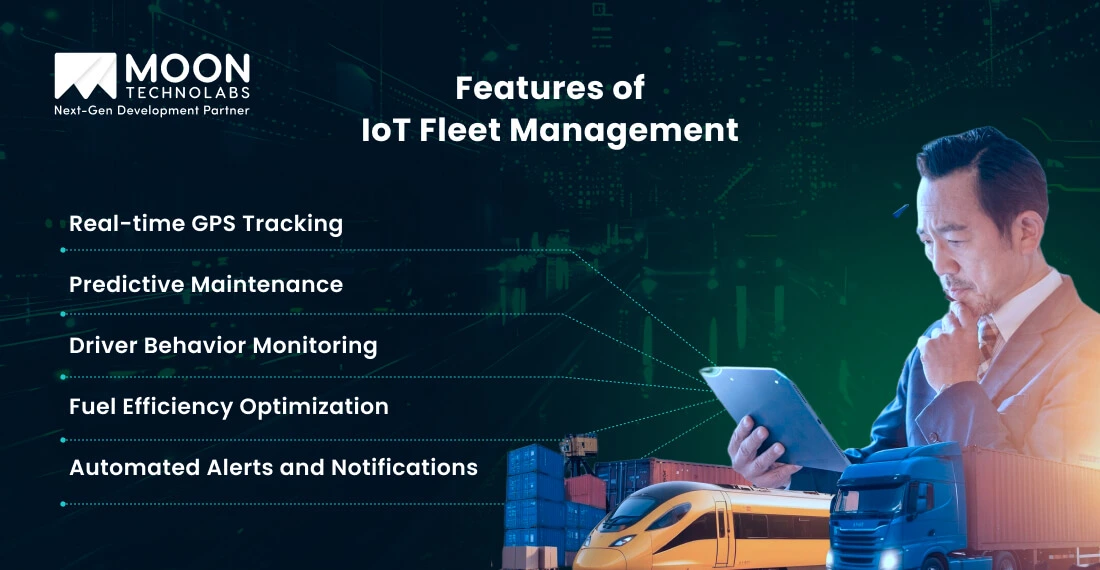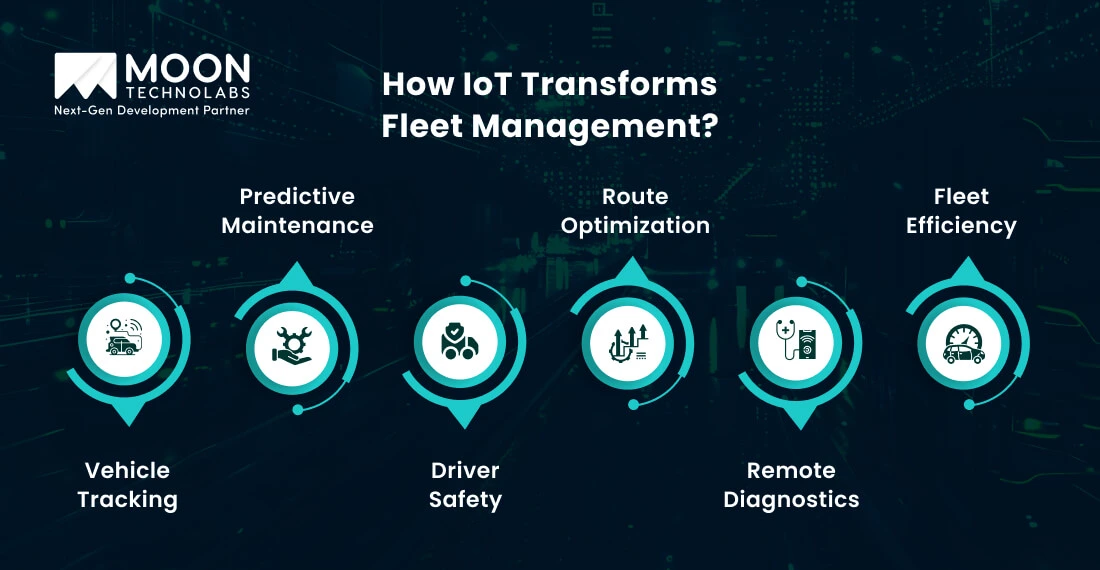Table of Content
Blog Summary:
The IoT Fleet Management blog covers how IoT improves fleet operations through features like real-time GPS tracking, predictive maintenance, and driver behavior monitoring. It highlights the importance of IoT for better decision-making, efficiency, and customer satisfaction.
Table of Content
The Internet of Things solutions have evolved from mere car tracking to complicated logistics management processes. Today, construction, agriculture, and transportation depend on fleet management for everyday operations and success.
So, how will IoT help commercial fleet management in 2025 and beyond? The worldwide IoT fleet management software market is expected to reach USD 37.7 billion by 2030.
However, poor fleet management and maintenance can increase expenses and hurt operations. Hence, adopting IoT-powered solutions is a strategic necessity for companies looking to grow in a competitive market.
From optimizing routes to enhancing driver safety, IoT solutions make fleet management agile, intelligent, and resilient. In this blog, we bring our extensive experience and expertise in delivering comprehensive services in the IoT sector.
IoT for fleet management represents a paradigm shift in how automobiles, gadgets, and systems link and interact. It creates a network that facilitates smooth data interchange and real-time actionable insights. It combines connections, software, and sensors to make it easier for fleet management, infrastructure, and cars to share information.
This connection allows decision-makers to quickly make strategic and well-informed decisions, giving them a complete picture of their fleet’s performance. By offering a strong framework for effectively tracking, monitoring, and managing assets, IoT solutions provide a comprehensive approach to fleet management.
Additionally, monitoring driver behavior promotes safer driving practices, leading to fewer accidents. Optimizing routes and fuel usage through IoT solutions also results in significant cost savings. These advantages underscore IoT’s importance in transforming fleet management practices.
You Might Also Like:
Moon Technolabs Ranked as Top IoT Developers in USA by Techreviewer
The IoT is revolutionizing how companies manage their fleets of vehicles. By connecting cars to the internet, IoT enables real-time data collection and analysis, allowing fleet managers to monitor vehicle locations, performance, and driver behaviors instantly.
This connectivity leads to more efficient route planning, timely maintenance, and improved safety measures, ultimately reducing operational costs and enhancing overall productivity. Moreover, IoT enhances decision-making by providing managers with immediate access to critical information.
For instance, if a vehicle deviates from its planned route or exhibits signs of mechanical issues, the system can alert managers promptly, enabling swift corrective actions. This proactive approach prevents potential problems and ensures that deliveries are made on time, thereby boosting customer satisfaction.
IoT transforms fleet operations by making them more responsive, reliable, and customer-centric.

Route optimization is a critical feature of IoT fleet management, enabling businesses to streamline their operations by determining the most efficient paths for their vehicles. This not only reduces fuel consumption and travel time but also enhances overall fleet productivity and customer satisfaction.
With IoT, each vehicle has a GPS device that continuously sends its location to the manager’s office. This means managers can see where all their cars are at any moment. Knowing the exact locations helps plan the best routes, avoid traffic, and ensure that deliveries or services are on time.
It’s like having a live map that shows where all the vehicles are, helping everything run smoothly.
IoT helps by collecting data from the vehicle’s systems to predict when a part might need attention before it breaks down. By addressing these maintenance needs early, companies can prevent unexpected problems, keep the vehicles running longer, and save money on repairs.
It’s like knowing when something might go wrong ahead of time so you can fix it before it becomes a big issue.
Safety is paramount on the road. IoT systems monitor how drivers operate the vehicles, such as their speed, how quickly they accelerate or brake, and how they take turns. If the system notices risky driving habits, it can alert the driver to be more careful.
This helps drivers improve their skills, reduces the chance of accidents, and makes the roads safer for everyone.
Fuel is a significant cost for companies that manage many vehicles. IoT systems track how much fuel each vehicle uses and can identify patterns that waste fuel, like excessive idling or aggressive driving.
By understanding these patterns, managers can train drivers to focus on using less fuel, which saves money and is better for the environment. It’s like having a guide that helps you use resources more wisely.
IoT systems can send instant alerts to managers and drivers about important events. For example, if a vehicle is speeding, needs maintenance, or is used without permission, the system will notify the relevant people immediately.
These timely alerts allow quick actions to address issues, ensuring the fleet operates safely and efficiently. It’s like having a vigilant assistant informing everyone about what’s happening.
Customizable add-ons such as dashcams, electronic logging devices, and fuel card integrations can further enhance fleet management solutions.

Imagine a world where vehicles, like cars and trucks, can “talk” to their managers through the Internet. IoT technology makes this possible. Let’s explore how IoT transforms fleet management in easy-to-understand ways.
With IoT, each vehicle is equipped with special mobile devices that instantly send information about its location and status to the managers. This means managers always know their vehicles’ locations and how they are doing. This constant monitoring ensures that everything runs smoothly and safely.
Vehicles need maintenance to keep running well. IoT helps by collecting vehicle data and analyzing it to predict when a part might need fixing or replacing. By knowing this in advance, companies can prevent unexpected breakdowns, keeping the vehicles on the road longer and avoiding costly repairs.
IoT systems monitor drivers’ behavior on the road. If a driver speeds, brakes too hard, or takes sharp turns, the system notices and alerts the driver to be more careful. This feedback helps drivers adopt safer habits, leading to fewer accidents and a safer journey for everyone.
Finding the best path to travel saves time and fuel. IoT analyzes current traffic conditions and vehicles’ performance to suggest the most efficient routes. By following these innovative routes, drivers can avoid traffic jams, reduce fuel consumption, and deliver goods faster.
Sometimes, vehicles have issues that need attention. With IoT, technicians can check what’s wrong with a car from far away by looking at the data it sends. This means they can often fix problems without needing to inspect the car in person, reducing the time the vehicle is out of service and keeping it on the road.
IoT helps companies use their vehicles more effectively. By analyzing data on how and when vehicles are used, managers can reduce the times when vehicles are idle and ensure they are always working when needed. This maximizes productivity and ensures that each car contributes its best to the company’s operations.
Implementing an IoT-based fleet management system offers numerous advantages, including enhanced operational efficiency and reduced costs. These benefits empower businesses to optimize their fleet operations, ensuring productivity and sustainability.
Companies can save money by using IoT fleet management. For example, the system analyzes traffic conditions and suggests the quickest paths for drivers, reducing fuel consumption and saving time.
Monitoring driving habits helps identify behaviors that waste fuel, such as excessive idling or rapid acceleration. Addressing these habits leads to significant fuel savings.
IoT Fleet Management enhances company operations by automating tasks like scheduling maintenance projects or dispatching vehicles, reducing manual work, and minimizing errors.
Real-time data analysis allows receiving instant information about vehicle locations and performance, enabling quick decisions to keep operations running smoothly.
Safety is a top priority, and IoT Fleet Management contributes by monitoring driver behavior as the system tracks actions like speeding or harsh braking. If risky behaviors are detected, managers can provide feedback to encourage safer driving.
Promoting better driving habits can reduce the likelihood of accidents and keep drivers and others on the road safer.
Having immediate access to information is crucial. IoT Fleet Management offers instant updates so managers can see where each vehicle is and how it’s performing at any moment.
Quick decision-making with up-to-date data allows companies to respond promptly to issues, ensuring efficient operations.
Being kind to the environment is essential, and this technology helps by improving fuel efficiency and reducing pollution with optimized routes and better driving habits.
Lowering emissions with efficient fuel use means fewer harmful gases are released into the air, contributing to a healthier planet.
Happy customers are essential for any business. IoT Fleet Management enhances customer experiences by ensuring timely deliveries with optimized routes and real-time tracking so that products arrive on time, keeping customers satisfied.
Providing transparent tracking so that customers can monitor their deliveries and know exactly when to expect them builds trust and loyalty.
One of the top use cases of IoT fleet management is the standout feature of GPS vehicle tracking. This technology empowers businesses to monitor and manage their fleets efficiently, ensuring optimal performance. Let’s understand how:
IoT allows businesses to track the real-time location of their vehicles. This capability ensures timely deliveries, enhances security, and enables quick responses to any issues that may arise during transit.
By collecting data on vehicle performance, IoT systems can predict when maintenance is needed. This proactive approach prevents unexpected breakdowns, reduces repair costs, and ensures vehicles are always ready for use.
IoT monitors driver behavior, providing insights into habits like speeding, harsh braking, and rapid acceleration. This information helps businesses offer targeted training to improve driving habits, leading to safer roads and reduced insurance costs.
IoT systems analyze traffic patterns, weather conditions, and other factors to suggest the most efficient routes for drivers. This optimization reduces travel time and fuel consumption and enhances overall operational efficiency.
IoT can monitor cargo conditions for businesses transporting goods, such as temperature and humidity. This ensures products are delivered in optimal conditions, which is especially important for perishable items.
IoT tracks fuel usage across the fleet, identifying patterns and areas for improvement. By addressing inefficiencies, businesses can reduce fuel costs and minimize their environmental impact.
IoT systems can automatically track and report compliance requirements, such as driver hours and vehicle inspections. This automation reduces administrative burdens and ensures adherence to regulations.
You Might Also Like:
IoT in Manufacturing Industry: 10 Use Cases and Future Trends
Here are the best practices for maximizing the potential of IoT fleet management and ensuring efficiency and security in your operations.
Protecting the data collected by IoT systems is crucial. Implement strong cybersecurity measures to prevent unauthorized access and ensure the privacy of sensitive information.
Keeping IoT hardware and systems updated ensures they function correctly and securely. Regular updates can introduce new features, improve device performance, and fix security vulnerabilities.
Educate drivers on how to use IoT-enabled tools and understand the insights provided. This training empowers drivers to make informed decisions, improving safety and efficiency.
Review, assess, and maintain IoT systems regularly to ensure they operate effectively. Periodic reviews and audits can identify potential issues before they become problems, ensuring the longevity and reliability of the technology.
Boost productivity and safety with advanced IoT fleet management. Let’s build a smarter, data-driven future for your fleet.
At Moon Technolabs, our experts integrate AI-driven analytics and blockchain technologies to enhance data security and accuracy. We are an IoT development company providing real-time monitoring and predictive maintenance support to help your business make data-driven decisions for operational excellence.
Create an efficient, cost-effective, and reliable fleet management environment. Contact our experts to build revolutionary fleet management software and telematics platforms with better visibility and control.
Our user-centric approach, proficiency in multiple technologies, and adherence to high-quality standards make us a reliable partner for IoT development solutions.
01
02
03
04
05
Submitting the form below will ensure a prompt response from us.